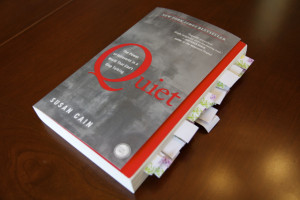 Hi all, welcome to our first book review! We wanted to share some of the books we’re reading as we explore our roles as introverted parents, and we’re starting with Susan Cain. You’ve probably heard about her book: Quiet: The Power of Introverts in a World That Can’t Stop Talking.
Hi all, welcome to our first book review! We wanted to share some of the books we’re reading as we explore our roles as introverted parents, and we’re starting with Susan Cain. You’ve probably heard about her book: Quiet: The Power of Introverts in a World That Can’t Stop Talking.
If you know me in real life, you’ve definitely heard about this book because I won’t stop telling people about it.
 This is my copy. I think it’s safe to say it spoke to me.
This is my copy. I think it’s safe to say it spoke to me.
Overview:
There’s a reason the title starts off with “Quiet” and not “Introverts” – Cain isn’t a psychologist (she’s a lawyer-turned-writer) and she’s exploring more than just the strict definition of introversion as a personality trait. She’s also looking at a group of traits that are often connected, including being risk-averse, introspective, shy. These types of people, and their strengths, are often overlooked in American society, Cain argues. She traces the rise of what she calls the Extrovert Ideal, pointing out ways our society prizes gregarious, assertive, bold, LOUD people.
Through profiles of famous (and not-so-famous) introverts, examinations of different psychological theories, and an exploration of the connection between solitude and creativity, Cain gives introverts permission to be themselves. Being an introvert isn’t just okay, she tells us. It’s important.
Why Introverts Should Read This Book:
So you can say “So there!” to everyone who’s ever told you you’re too quiet. Just kidding. Kind of. I’ve heard about so many people who feel empowered by this book, who didn’t even realize that being an introvert was normal. And even though I already knew my personality type, it never hurts to be reminded that, no, our society really is not geared toward people like me. If I feel out of step sometimes, that’s why, not because I’m doing something wrong.
Other takeaways: Introverts and extroverts need different levels of outside stimulation, and I like Cain’s idea of “sweet spots” – figuring out your just-right level and seeking out experiences that fit. She also makes the point that even introverts need to keep adjusting, which explains why I can sometimes get stir-crazy on a Sunday afternoon at the end of a laid-back weekend.
For me, Cain’s discussion of Elaine Aron’s research on highly sensitive people was eye-opening. Not all introverts are highly sensitive, but I think I do fall into this category. It’s giving me insight into why I get overwhelmed so much more quickly than iDad, even though we’re both introverts. Expect more banging on about this one from me in the future!
Why Extroverts Should Read This Book:
To get a better idea about how the other one-third to one-half of the population lives. I think this book should be required reading for extroverted managers and teachers, or for any extrovert who’s in charge of a group of people.
Cain also examines the benefits of working solo – turns out creativity is harder to come by in a group environment. Many introverts already know this (group projects, blech!), but it’s startling to see how our schools and our workplaces have embraced what Cain has named the “New Groupthink”. I read here that she’s working on a curriculum to help teachers reach introverts in the classroom, and I think that’s a fantastic idea.
Why Parents Should Read This Book:
If you’re raising an introvert, Chapter 11 of Quiet is for you. While Cain encourages parents to enjoy their kids for who they are, she also has great tips for helping them feel more confident and comfortable in this overstimulating world of ours. Don’t throw your kid into a new situation with a “She’ll be fine!” attitude, help her find ways to get used to things at her own pace. Check out a new place ahead of time if possible, arrive early, don’t push. And, instead of criticizing your child for acting shy, praise her when she stretches herself.
Parents, too, should carefully read the sections about school. I am not (NOT!) encouraging helicopter parenting, but it’s worth considering whether your kid’s classroom environment is geared more toward extroverts. At Doodlebug’s school, I was surprised to find that her first grade class didn’t use desks — the kids sat at tables together like they did in kindergarten.
There’s a great list of factors to consider if you’re in a position to choose a school for your kids (Small classes? Anti-bullying program? Subjects or extracurriculars your child is drawn to?). But Cain has good suggestions for helping your kids thrive at any school. Also, she makes the excellent point that your introverted child might need time to decompress at the end of the day, so give them time to do that before you start peppering them with questions. You just might get more info out of them that way.
Bonus materials:
Cain gave a TED talk in 2012 that touches on the main points in her book. Definitely worth 20 minutes of your time.
**********************
So have you read Quiet? What did you think? I’ve started leaving my copy in our guest room – maybe all our visitors will pick it up and learn something about themselves (or about a favorite introvert). Muahahaha!
–Kathy
